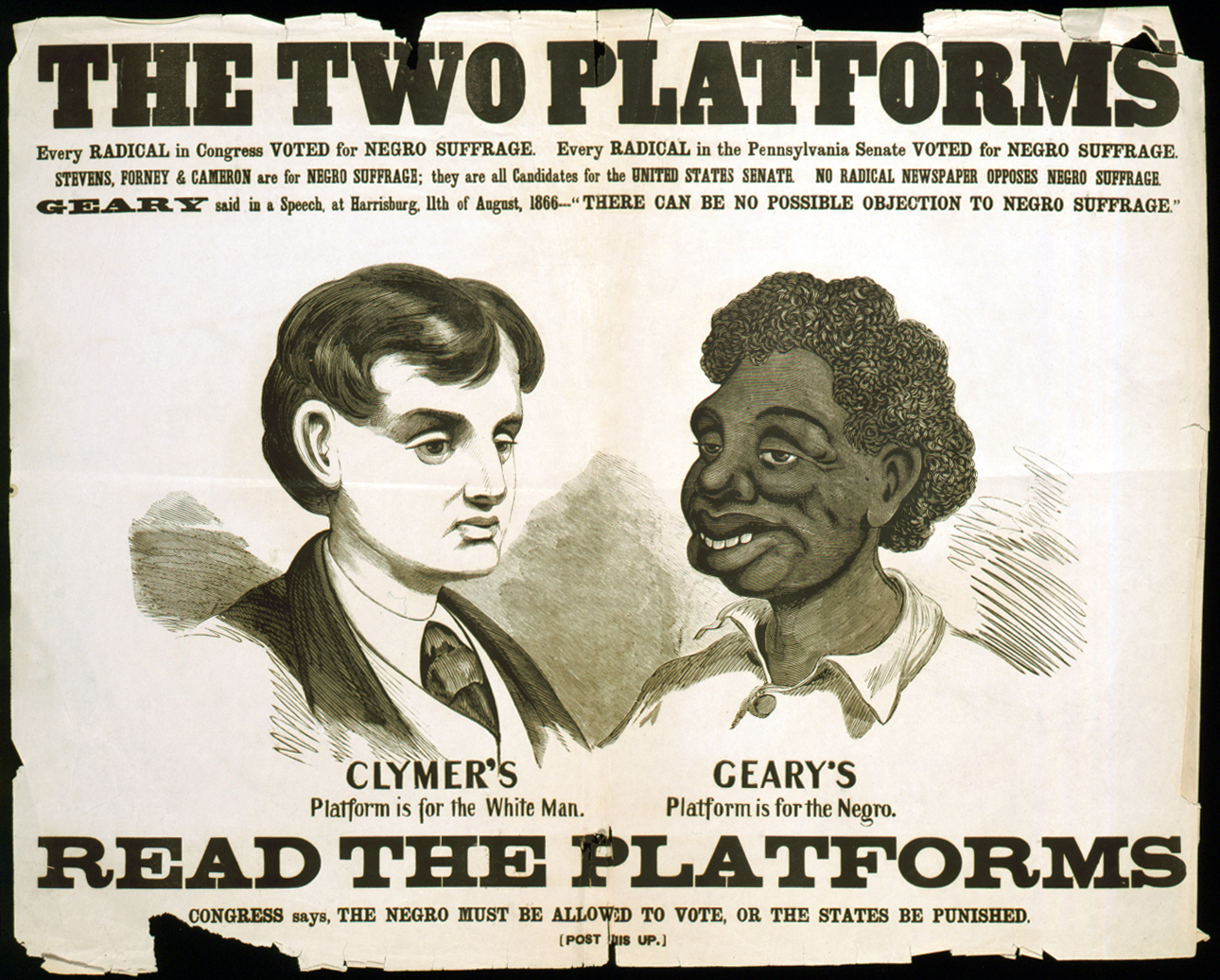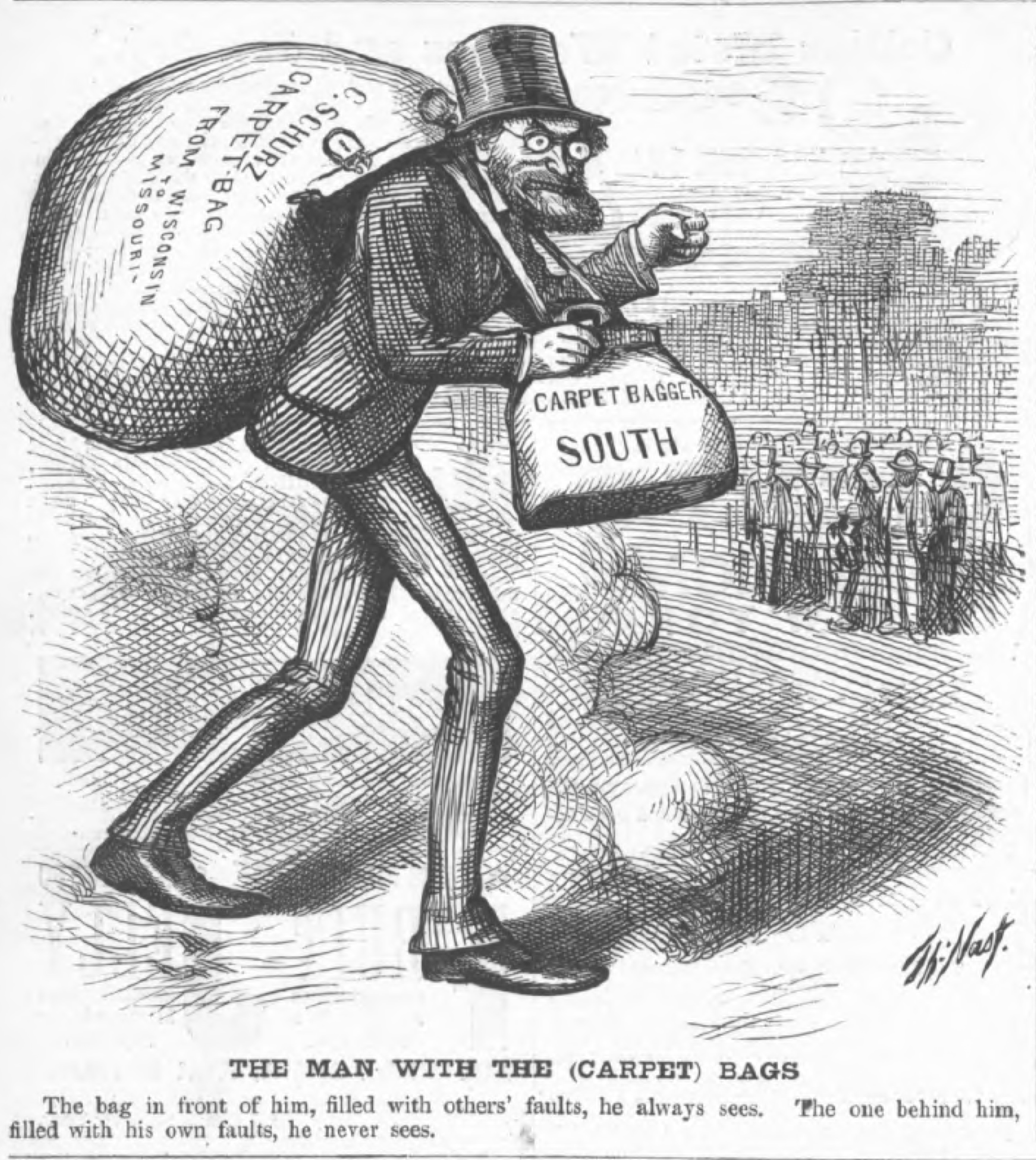|
Lily-white Movement
The Lily-White Movement was an anti-black political movement within the Republican Party in the United States in the late 19th and early 20th centuries. It was a response to the political and socioeconomic gains made by African-Americans following the Civil War and the Thirteenth Amendment to the Constitution, which eliminated slavery and involuntary servitude (" except as punishment for a crime"). During Reconstruction, Black leaders in the South gained influence in the Republican Party by organizing Black people as an important voting bloc via Union Leagues and the biracial black-and-tan faction of the Republicans. Conservative whites attempted to eliminate this influence and recover white voters who had defected to the Democratic Party. The Lily-White Movement proved successful throughout the South and was a key factor in the growth of the Republican Party in the region. Terminology The term ''Lily-White Movement'' was coined by black Texas Republican leader Norri ... [...More Info...] [...Related Items...] OR: [Wikipedia] [Google] [Baidu] |
Norris Wright Cuney
Norris Wright Cuney (May 12, 1846March 3, 1898) was an American politician, businessman, union leader, and advocate for the rights of African-Americans in Texas. Following the American Civil War, he became active in Galveston politics, serving as an alderman and a national Republican delegate. He was appointed as United States Collector of Customs in 1889 in Galveston. Cuney had the highest-ranking appointed position of any African American in the late 19th-century South.Hales (2003), p.16 He was a member of the Union League and helped attract black voters to the Republican Party; in the 1890s, more than 100,000 blacks were voting in Texas. Establishing his own stevedores business, he helped to unionize black workers in Galveston, opening jobs for them on the docks. He substantially improved employment and educational opportunities for blacks in the city. He eventually rose to the chairmanship of the Texas Republican Party and became a national committeeman. Cuney is regard ... [...More Info...] [...Related Items...] OR: [Wikipedia] [Google] [Baidu] |
Disenfranchisement After The Reconstruction Era
Disfranchisement after the Reconstruction era in the United States, especially in the Southern United States, was based on a series of laws, new constitutions, and practices in the South that were deliberately used to prevent black citizens from registering to vote and voting. These measures were enacted by the former Confederate states at the turn of the 20th century. Efforts were also made in Maryland, Kentucky, and Oklahoma. Their actions were designed to thwart the objective of the Fifteenth Amendment to the United States Constitution, ratified in 1870, which prohibited states from depriving voters of their voting rights based on race. The laws were frequently written in ways to be ostensibly non-racial on paper (and thus not violate the Fifteenth Amendment), but were implemented in ways that selectively suppressed black voters apart from other voters. In the 1870s, white racists had used violence by domestic terrorism groups (such as the Ku Klux Klan), as well as fraud, to ... [...More Info...] [...Related Items...] OR: [Wikipedia] [Google] [Baidu] |
Edmund J
Edmund is a masculine given name in the English language. The name is derived from the Old English elements ''ēad'', meaning "prosperity" or "riches", and ''mund'', meaning "protector". Persons named Edmund include: People Kings and nobles *Edmund the Martyr (died 869 or 870), king of East Anglia *Edmund I (922–946), King of England from 939 to 946 *Edmund Ironside (989–1016), also known as Edmund II, King of England in 1016 * Edmund of Scotland (after 1070 – after 1097) *Edmund Crouchback (1245–1296), son of King Henry III of England and claimant to the Sicilian throne *Edmund, 2nd Earl of Cornwall (1249–1300), earl of Cornwall; English nobleman of royal descent *Edmund of Langley, 1st Duke of York (1341–1402), son of King Edward III of England * Edmund Tudor, earl of Richmond (1430–1456), English and Welsh nobleman * Edmund, Prince of Schwarzenberg (1803–1873), the last created Austrian field marshal of the 19th century In religion * Saint Edmund (disambiguati ... [...More Info...] [...Related Items...] OR: [Wikipedia] [Google] [Baidu] |
Sarah Woolfolk Wiggins
Sarah Van Voorhis Woolfolk Wiggins (June 29, 1934 - April 12, 2020) was a history professor at the University of Alabama in Tuscaloosa, Alabama. She was the first woman in the university's history department and edited ''The Alabama Review'' for 20 years. She was born in Montgomery, Alabama. She studied at Huntingdon College and then Louisiana State University under professor T. Harry Williams. She married and had children. She raised them on her own after her husband died. In the 1960s and 1970s she wrote several articles and a book on Reconstruction era The Reconstruction era was a period in History of the United States, US history that followed the American Civil War (1861-65) and was dominated by the legal, social, and political challenges of the Abolitionism in the United States, abol ... politics in Alabama. Bibliography *''The Role of the Scalawag in Alabama Reconstruction'' by Sarah Woolfolk Wiggins, Louisiana State University, 1965 *''The Scalawag In Alabama P ... [...More Info...] [...Related Items...] OR: [Wikipedia] [Google] [Baidu] |
Ku Klux Klan
The Ku Klux Klan (), commonly shortened to KKK or Klan, is an American Protestant-led Christian terrorism, Christian extremist, white supremacist, Right-wing terrorism, far-right hate group. It was founded in 1865 during Reconstruction era, Reconstruction in the devastated South. Various historians have characterized the Klan as America's first Terrorism, terrorist group.Fergus Bordewich. (2023). ''Klan War: Ulysses S Grant and the Battle to Save Reconstruction''. Penguin Random House The group contains several organizations structured as a secret society, which have frequently resorted to terrorism, violence and acts of intimidation to impose their criteria and oppress their victims, most notably African Americans, Jews, and Catholics. A leader of one of these organizations is called a Grand Wizard, grand wizard, and there have been three distinct iterations with various other targets relative to time and place. The first Klan was established in the Reconstruction era for me ... [...More Info...] [...Related Items...] OR: [Wikipedia] [Google] [Baidu] |
Scalawags
In United States history, scalawag (sometimes spelled scallawag or scallywag) was a pejorative slur referred to white Southerners who supported Reconstruction policies and efforts after the conclusion of the American Civil War. As with the term '' carpetbagger'', the word has a long history of use as a slur in Southern partisan debates. The post-Civil War opponents of the scalawags claimed they were disloyal to traditional values and white supremacy.Ted Tunnell. 2006. Creating "The Propaganda of History": Southern Editors and the Origins of "Carpetbagger and Scalawag". The Journal of Southern History, Vol. 72, No. 4 (Nov., 2006), pp. 789–822 Scalawags were particularly hated by 1860s–1870s Southern Democrats, who called Scalawags ''traitors to their region'', which was long known for its widespread chattel slavery of Black people. Before the American Civil War, most Scalawags had opposed southern states' declared secession from the United States to form the Confederate S ... [...More Info...] [...Related Items...] OR: [Wikipedia] [Google] [Baidu] |
Carpetbaggers
In the history of the United States, carpetbagger is a largely historical pejorative used by Southerners to describe allegedly opportunistic or disruptive Northerners who came to the Southern states after the American Civil War and were perceived to be exploiting the local populace for their own financial, political, or social gain. The term broadly included both individuals who sought to promote Republican politics (including the right of African Americans African Americans, also known as Black Americans and formerly also called Afro-Americans, are an American racial and ethnic group that consists of Americans who have total or partial ancestry from any of the Black racial groups of Africa ... to vote and hold office) and individuals who saw business and political opportunities because of the chaotic state of the local economies following the war. In practice, the term carpetbagger often was applied to any Northerners who were present in the South during the Rec ... [...More Info...] [...Related Items...] OR: [Wikipedia] [Google] [Baidu] |
United States Congress
The United States Congress is the legislature, legislative branch of the federal government of the United States. It is a Bicameralism, bicameral legislature, including a Lower house, lower body, the United States House of Representatives, U.S. House of Representatives, and an Upper house, upper body, the United States Senate, U.S. Senate. They both meet in the United States Capitol in Washington, D.C. Members of Congress are chosen through direct election, though vacancies in the Senate may be filled by a Governor (United States), governor's appointment. Congress has a total of 535 voting members, a figure which includes 100 United States senators, senators and 435 List of current members of the United States House of Representatives, representatives; the House of Representatives has 6 additional Non-voting members of the United States House of Representatives, non-voting members. The vice president of the United States, as President of the Senate, has a vote in the Senate ... [...More Info...] [...Related Items...] OR: [Wikipedia] [Google] [Baidu] |
Eric Foner
Eric Foner (; born February 7, 1943) is an American historian. He writes extensively on American political history, the history of freedom, the early history of the Republican Party, African American biography, the American Civil War, Reconstruction, and historiography, and has been a member of the faculty at the Columbia University Department of History since 1982. He is the author of several popular textbooks, such as the ''Give Me Liberty'' series for high school classrooms. According to the Open Syllabus Project, Foner is the most frequently cited author on college syllabi for history courses. Foner has published several books on the Reconstruction period, starting with '' Reconstruction: America's Unfinished Revolution, 1863–1877'' in 1988.Perman, Michael. "Eric Foner's Reconstruction: A Finished Revolution". ''Reviews in American History,'' Vol. 17, No. 1. (March 1989), pp. 73–78. His online courses on "The Civil War and Reconstruction", published in 2014, are avail ... [...More Info...] [...Related Items...] OR: [Wikipedia] [Google] [Baidu] |
Freedmen
A freedman or freedwoman is a person who has been released from slavery, usually by legal means. Historically, slaves were freed by manumission (granted freedom by their owners), emancipation (granted freedom as part of a larger group), or self-purchase. A fugitive slave is a person who escaped enslavement by fleeing. Ancient Rome Rome differed from Greek city-states in allowing freed slaves to become plebeian citizens. The act of freeing a slave was called ''manumissio'', from ''manus'', "hand" (in the sense of holding or possessing something), and ''missio'', the act of releasing. After manumission, a slave who had belonged to a Roman citizen enjoyed not only passive freedom from ownership, but active political freedom ''(libertas)'', including the right to vote. A slave who had acquired ''libertas'' was known as a ''libertus'' ("freed person", feminine ''liberta'') in relation to his former master, who was called his or her patron ''( patronus)''. As a social class, fre ... [...More Info...] [...Related Items...] OR: [Wikipedia] [Google] [Baidu] |
Reconstruction Era
The Reconstruction era was a period in History of the United States, US history that followed the American Civil War (1861-65) and was dominated by the legal, social, and political challenges of the Abolitionism in the United States, abolition of slavery and reintegration of the former Confederate States of America, Confederate States into the United States. Reconstruction Amendments, Three amendments were added to the United States Constitution to grant citizenship and equal civil rights to the Freedmen, newly freed slaves. To circumvent these, former Confederate states imposed poll taxes and literacy tests and engaged in terrorism in the United States, terrorism to intimidate and control African Americans and discourage or prevent them from voting. Throughout the war, the Union was confronted with the issue of how to administer captured areas and handle slaves escaping to Union lines. The United States Army played a vital role in establishing a Labour economics, free lab ... [...More Info...] [...Related Items...] OR: [Wikipedia] [Google] [Baidu] |





